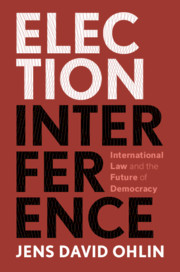Book contents
- Election Interference
- Election Interference
- Copyright page
- Dedication
- Contents
- Acknowledgements
- Introduction
- 1 What Is Election Interference?
- 2 Election Interference Is Not Cyber-War
- 3 Limits of the Sovereignty Framework
- 4 The Promise of Self-Determination
- 5 Foreign Electioneering and Transparency
- 6 Free Speech and Elections
- 7 The Value of Criminal Prosecutions
- 8 Soliciting Foreign Interference
- Conclusion
- Index
6 - Free Speech and Elections
Published online by Cambridge University Press: 09 June 2020
- Election Interference
- Election Interference
- Copyright page
- Dedication
- Contents
- Acknowledgements
- Introduction
- 1 What Is Election Interference?
- 2 Election Interference Is Not Cyber-War
- 3 Limits of the Sovereignty Framework
- 4 The Promise of Self-Determination
- 5 Foreign Electioneering and Transparency
- 6 Free Speech and Elections
- 7 The Value of Criminal Prosecutions
- 8 Soliciting Foreign Interference
- Conclusion
- Index
Summary
This chapter uses the example of social media labeling as a test case for determining whether the First Amendment will be a barrier to implementing legislative solutions for securing election integrity. These solutions would either require or encourage social media tech firms to label political speech that has a foreign origin. To determine if this would be constitutional, this chapter addresses the following questions in sequence. First, are foreigners protected by the First Amendment? Second, if foreigners are not protected by the First Amendment, do Americans have a First Amendment right to receive or consume foreign speech? Third, are labeling and disclosure regimes consistent with the First Amendment, especially since they might compromise the core value of anonymity? Labeling and disclosure are common methods of regulation and are relatively uncontroversial in the commercial context. In contrast, labeling and disclosure regimes in the political context are far more controversial and demand a more searching level of constitutional scrutiny. Finally, the last question is whether international human rights law or European human rights law might impose constraints on social media regulation.
Keywords
- Type
- Chapter
- Information
- Election InterferenceInternational Law and the Future of Democracy, pp. 147 - 169Publisher: Cambridge University PressPrint publication year: 2020

